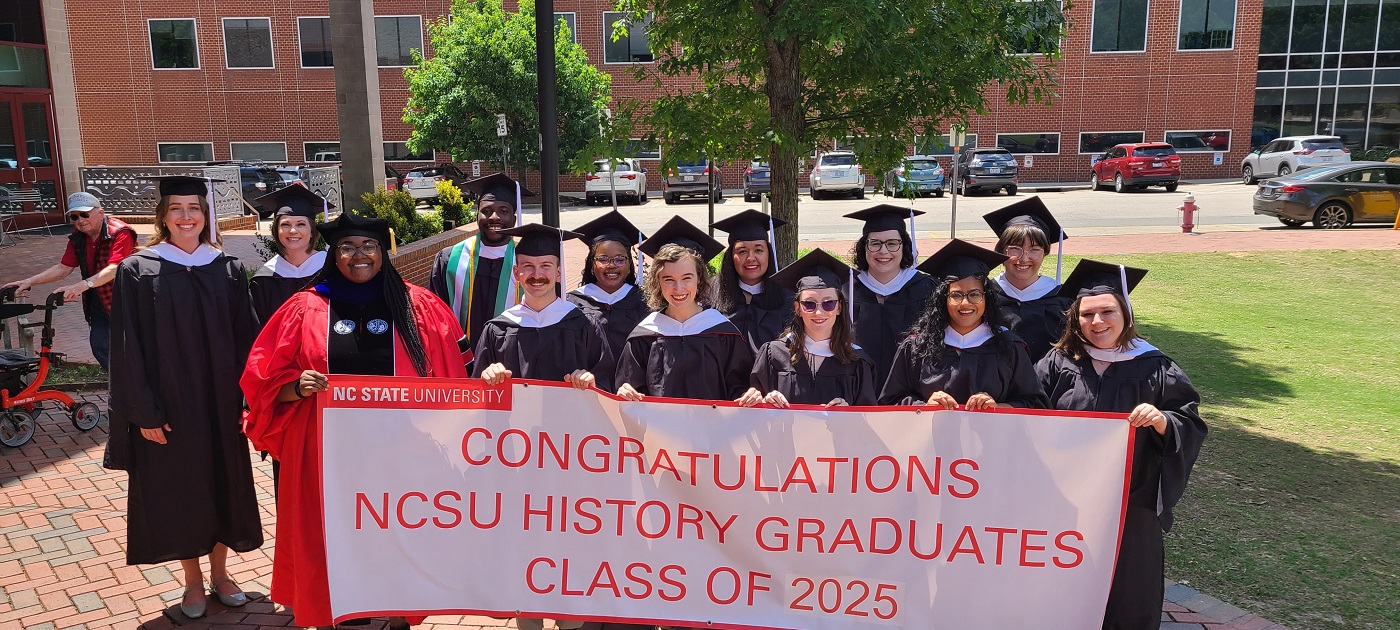In Memoriam – Jim Mulholland
Our retired colleague James Mulholland passed away on July 26, 2019 at age 83. Jim came to NC State in 1972 as an Instructor, while completing his Ph.D. (University of Delaware) with a dissertation on colonial American metallurgy. He was appointed Assistant Professor in 1975. The University of Alabama Press published his A History of Metals in Colonial America in 1981.
Jim earned his B.S. from MIT, and an M.S. from University of Bridgeport and an M.A. from Wesleyan University. He worked in industry before, in Professor Emeritus John Riddle’s word, he “fell from grace and became a professor.” He also taught public school – he had some great horror stories. Jim always had the appropriate skepticism of engineering without humanistic perspective — along with the appropriate skepticism about many academic follies. He would keep his counsel with a slight, indulgent smile on his face, when he heard some of his colleagues speak on science-technology. But he was also a tireless advocate for the importance of engineers and scientists learning something of the humanities.
He was Director of Advising for us for many years, with a tremendous ethic of service to students and to the department. His energy was directed towards students in and out of the classroom. He took advising seriously: he was often in his office and it was always open; he knew the rules thoroughly; he gave no comfort to slackers; and finally, he was compassionate and helpful for those who needed sound academic guidance.
Jim was a master of bureaucratic systems and absurd procedures and paperwork — and his expertise paid off as our representative to various curriculum committees and “reform” commissions for years. He relished fighting the good fight to make processes more sensible. He even was occasionally successful, primarily because he generated tremendous respect among our STEM colleagues. For many years after Jim retired, whenever some senseless bureaucratic Gordian’s Knot emerged from the administration, someone would remark, “Where’s Mulholland when we need him!”
Jim also gave tirelessly of his time to help colleagues navigate the arcane ways of creating new courses and developing programs. Professor Tom Parker remembers that no one provided more service on so many fronts to colleagues than Jim. It may have seemed thankless at times, but colleagues knew that he spared many from such tasks. Professor Emeritus William Harris remembers that when Jim served for him as assistant department head during the 1990s, he was a “good security blanket.” He considers that no one deserves more credit for the success of the History Department, beginning in the 1970s, than Jim Mulholland.
One part of the successful growth of the department was the innovation in the 1980s of the Archival Management Program within the MA in History. As John David Smith, now Charles H. Stone Distinguished Professor of American History at UNC-Charlotte, recalls, Jim was an immense supporter of expanding the graduate program, unfailing in his support of a new junior colleague and his work. He encouraged Professor Smith to plow full speed ahead with the program–even when naysayers had reservations about the alleged intellectual rigor of its curriculum and questioned its success. It became our strong Public History program.
Jim was relished as a quirky iconoclast. There was a charming irony that a numbers-oriented, ex-engineer, scholar of technology refused to have a computer in his office or use email (back in the dark ages of early systems). It was part and parcel of his commitment to asking about the value of any process, and the computer didn’t add anything for him that he couldn’t do just as well with existing technology. This didn’t mean he was not conversant with the tech world. In fact, for many years he was a central figure on the radioactive and hazardous substances committee that keeps up with the regulation and safety and reporting for our campus nuclear reactor.
As many colleagues attest, Jim was also unfailingly honest and direct – a refreshing quality among intellectuals. A big, imposing man, his gruff crankiness could not hide a truly helpful colleague. Nor the many kindnesses he extended to young colleagues. He combined a hard-nosed common sense with a richly humane spirit.
His interests and expertise outside history included, most notably, birds and classical music. Both benefitted from his prodigious memory and ear. A long-time supporter of the North Carolina Symphony, he had deep and extensive knowledge of music. As a birder, he was a phenomenon. But Jim didn’t just know birds – the usual recognition of plumage, fieldmarks, songs, and behaviors. Jim remembered hundreds of individual observations, usually with a story to go with each. For 45 years, he covered the same territory (West Raleigh and the NC State farms) in the Audubon Christmas Count, and he became a living library of knowledge of our local landscape and its changes. Travel usually meant coming home with some wonderful tale of his encounters, along with a growing life-list. He could also be amusingly self-deprecating about “listers” – such as when he recognized with a sardonic grin that taxonomic revisions splitting some species automatically gave him “new” birds to claim.
In retirement after 1998, he was able to continue his interests, content to be out of the way of a continually evolving department, but always pleased to hear good news about old colleagues. And always appreciative of a good tale of frustration from the bureaucratic labyrinth.
Jim is survived by his wife Marillyn, daughters Carol and Martha, and grandchildren.
- Categories:


